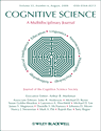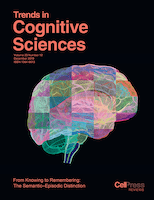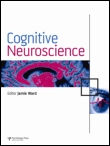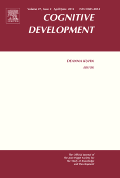
COGNITIVE SCIENCE
Scope & Guideline
Innovating Insights in Cognitive Science
Introduction
Aims and Scopes
- Interdisciplinary Research:
Cognitive Science emphasizes a multidisciplinary approach, incorporating insights from psychology, neuroscience, linguistics, computer science, and philosophy to explore the complexities of cognitive processes. - Empirical Methods:
The journal publishes research employing diverse empirical methodologies, including experimental studies, computational modeling, and neuroimaging techniques, to investigate cognitive phenomena. - Language and Cognition:
A significant focus is placed on the interplay between language and cognitive processes, addressing how language shapes thought, communication, and social interaction. - Developmental Perspectives:
The journal explores cognitive development across the lifespan, examining how cognitive abilities emerge and evolve from infancy through adulthood. - Social Cognition:
Research on social cognition, including how individuals perceive, interpret, and respond to social cues and interactions, is a critical area of inquiry in the journal. - Artificial Intelligence and Cognition:
The journal investigates the implications of artificial intelligence for understanding human cognition, including studies on machine learning and human-computer interaction.
Trending and Emerging
- Computational Modeling:
An increasing number of studies utilize computational modeling to simulate cognitive processes, reflecting a trend towards integrating computational approaches to better understand complex cognitive phenomena. - Neuroscience Integration:
There is a growing emphasis on integrating neuroscience with cognitive science, with many papers exploring the neural underpinnings of cognitive processes, highlighting the importance of brain research in understanding cognition. - Social and Cultural Dimensions of Cognition:
Recent research has shown a rising interest in how social and cultural factors influence cognitive processes, emphasizing the contextual nature of cognition and the role of social interactions. - Embodied Cognition:
The concept of embodied cognition, which posits that cognitive processes are deeply rooted in bodily interactions with the environment, is increasingly featured in studies, reflecting a shift towards more holistic understandings of cognition. - Impact of Technology on Cognition:
Emerging themes include the effects of technology, particularly artificial intelligence and virtual environments, on cognitive processes, indicating a need to understand how modern tools shape human cognition.
Declining or Waning
- Traditional Cognitive Psychology:
Research that adheres strictly to traditional cognitive psychology frameworks is becoming less common, as the field increasingly embraces interdisciplinary approaches that incorporate insights from neuroscience and computational methods. - Behaviorist Approaches:
There is a noticeable decline in studies rooted in behaviorist paradigms, reflecting a shift towards understanding cognition as a complex interplay of internal processes rather than solely observable behavior. - Overemphasis on Individual Differences:
While individual differences remain an important topic, the focus on this area has waned in favor of broader cognitive processes and their interactions, reflecting a movement towards understanding cognition in more contextualized and dynamic terms.
Similar Journals

Journal of Cognition and Culture
Decoding the Cultural Dimensions of CognitionThe Journal of Cognition and Culture, published by BRILL, stands as a pivotal resource in the fields of Cultural Studies, Social Psychology, and Experimental and Cognitive Psychology. With an ISSN of 1567-7095 and E-ISSN of 1568-5373, this scholarly journal has been contributing to the academic discourse since 2001 and continues to provide insights into the interplay between cognitive processes and cultural phenomena. Based in the Netherlands, it boasts impressive rankings, including Q2 in Arts and Humanities (Miscellaneous) and Q1 in Cultural Studies for 2023, reflecting its significance in addressing complex cognitive and cultural issues. Although it operates under a traditional access model, the journal's commitment to rigorous peer review and high-impact research ensures its relevance and authority in the field. Researchers, educators, and students alike will find the articles and studies published herein an invaluable addition to their understanding of how cognitive functions shape, and are shaped by, cultural contexts.

TRENDS IN COGNITIVE SCIENCES
Innovating Knowledge in NeuropsychologyTRENDS IN COGNITIVE SCIENCES, published by CELL PRESS, stands as a premier platform for the dissemination of high-quality research in cognitive neuroscience, experimental psychology, and neuropsychology. With an impressive impact factor and consistently placed in the Q1 category across multiple dimensions of cognitive research, this journal not only ranks in the top tier of its fields—holding the 1st position in both Cognitive Neuroscience and Neuropsychology but also boasts an exceptional percentile ranking of 99. As it converges from 1997 to 2024, it reflects the evolving landscape of cognitive sciences, making it a vital resource for researchers, professionals, and students seeking to stay updated on influential trends and groundbreaking studies. Though not an open-access journal, TRENDS IN COGNITIVE SCIENCES offers readers access to a wealth of information that shapes our understanding of complex cognitive processes and behaviors.

JOURNAL OF COGNITIVE NEUROSCIENCE
Exploring the neural pathways of thought.Welcome to the JOURNAL OF COGNITIVE NEUROSCIENCE, a premier publication in the field of cognitive neuroscience, published by the esteemed MIT PRESS. Since its inception in 1989, this journal has been at the forefront of advancing our understanding of the neural mechanisms underlying cognitive processes, boasting an impressive convergence period through 2024. With its Q1 ranking in the 2023 cognitive neuroscience category, it stands out among 115 peers, indicating its critical role in shaping contemporary research. The journal offers a comprehensive array of research articles, reviews, and methodologies aimed at researchers, professionals, and students alike, facilitating the exploration of complex cognitive functions. While not an open-access journal, it provides essential insights and significant contributions to the neuroscience community, making it an invaluable resource for anyone keen on delving into the intricacies of the human brain.

Cognitive Neuroscience
Transforming Research into Cognitive BreakthroughsCognitive Neuroscience is a pivotal journal in the ever-evolving field of cognitive neuroscience, published by Routledge Journals, Taylor & Francis Ltd, in the United Kingdom. Since its inception in 2010, this journal has dedicated itself to publishing innovative research that explores the intricate relationships between neural mechanisms and cognitive processes. With an increasing focus on interdisciplinary studies, it addresses critical issues from both theoretical and empirical perspectives. Although it currently holds a Q3 ranking in the Cognitive Neuroscience category, it has made significant strides in its Scopus ranking, now positioned at #62 out of 115, reflecting its growing impact on the academic community. Researchers and professionals will find the journal an invaluable resource for staying updated on the latest findings and methodologies in the field. While the journal operates under a traditional access model, it ensures high visibility and dissemination of crucial research that shapes our understanding of the brain's role in cognition. As it continues to evolve through to 2024, Cognitive Neuroscience remains committed to fostering collaboration and inspiring future innovations within the discipline.

JOURNAL OF EXPERIMENTAL PSYCHOLOGY-ANIMAL LEARNING AND COGNITION
Advancing Insights into Learning and BehaviorJOURNAL OF EXPERIMENTAL PSYCHOLOGY-ANIMAL LEARNING AND COGNITION, published by the American Psychological Association, stands as a pivotal resource in the fields of animal learning and cognitive psychology. With an ISSN of 2329-8456 and an E-ISSN of 2329-8464, this journal has established its significance from its inception in 2014, demonstrating a robust commitment to advancing research through 2024 and beyond. The journal's prominence is reflected in its 2023 rankings, placing it in the Q2 quartile for both Ecology, Evolution, Behavior and Systematics and Experimental and Cognitive Psychology, which positions it among the leading publications in its domains. Researchers and professionals engaged in the intricate study of animal behavior, cognition, and their underlying psychological mechanisms will find this journal invaluable. Although it does not currently offer open access, the quality and rigor of the published research make it a key reference for advancing knowledge and understanding in psychology and beyond.

Constructivist Foundations
Navigating the Frontiers of Constructivist ResearchConstructivist Foundations is a distinguished academic journal dedicated to exploring the intersection of constructivist theories and interdisciplinary applications. Established in 2010 and published by ALEXANDER RIEGLER in Belgium, this journal aims to provide researchers, educators, and professionals with a platform to disseminate innovative ideas about learning, cognition, and scientific philosophy. With a focus on artificial intelligence, cognitive neuroscience, education, and the history and philosophy of science, Constructivist Foundations has made strides in contributing to meaningful discussions within these Q2 and Q3 ranked fields. Although it currently holds a Q4 status in several areas, it plays a crucial role in fostering knowledge and dialogue among scholars, thereby enhancing the understanding of constructivist principles across various domains. With robust academic engagement and open access options, this journal continues to shape the future of educational and cognitive research.

Wiley Interdisciplinary Reviews-Cognitive Science
Advancing interdisciplinary insights in cognitive science.Wiley Interdisciplinary Reviews-Cognitive Science (ISSN: 1939-5078, E-ISSN: 1939-5086), published by WILEY, stands as a premier academic journal dedicated to advancing the understanding of cognitive science through an interdisciplinary approach. Since its inception in 2010, the journal has rapidly established itself as a leading source of knowledge, achieving a Q1 ranking in the 2023 category of Medicine, Neuroscience, and Psychology, underscoring its significant impact within these fields. With a Scopus ranking of #27 in General Psychology and #30 in General Neuroscience, it offers researchers, professionals, and students access to cutting-edge research that bridges various disciplines, fostering collaboration and innovation. Though not openly accessible, this journal is critical for those aiming to stay at the forefront of cognitive science research, providing comprehensive reviews that synthesize emerging findings and highlight future directions for study.

Journal of Cognitive Science
Illuminating the Pathways of Thought and LanguageThe Journal of Cognitive Science, with ISSN 1598-2327, is a distinguished publication from SEOUL NATL UNIV, INST COGNITIVE SCIENCE, focusing on the multidisciplinary field of cognitive science. Established in 2016, this journal aims to advance knowledge in various domains, including Artificial Intelligence, Cognitive Neuroscience, and Experimental Psychology, while also delving into Linguistics and Language. Although currently categorized in Q4 for several subjects in the 2023 rankings, it presents an invaluable platform for innovative research and scholarly discourse, providing insights that connect cognitive processes with practical applications, thus fostering cross-disciplinary collaboration. Located in South Korea, the journal adheres to rigorous academic standards, inviting submissions that contribute significantly to understanding cognition in a digital age. While it does not offer Open Access, readers can access articles through university libraries and academic databases, engaging with the latest findings and theories that shape the future of cognitive science.

COGNITIVE DEVELOPMENT
Transforming Perspectives on Developmental PsychologyCognitive Development is a prestigious academic journal published by Elsevier Science Inc, focusing on the critical area of developmental and cognitive psychology. With an ISSN of 0885-2014 and an E-ISSN of 1879-226X, this journal serves as a vital platform for the dissemination of innovative research, theories, and methodologies from 1986 to the present, with the latest articles contributing to a comprehensive understanding of cognitive processes in children and adolescents. Positioned in the second quartile (Q2) of both the Developmental and Educational Psychology and Experimental and Cognitive Psychology categories, Cognitive Development holds an essential place in shaping contemporary psychological research, boasting robust Scopus rankings of #175/360 and #90/165 in its respective fields. Though not an open-access journal, it provides valuable insights and rigorous studies essential for researchers, professionals, and students engaged in the intricate processes of cognitive development. Whether you're looking to publish significant findings or simply stay updated on the latest advancements, Cognitive Development is an indispensable resource in the psychological community.

Cognitive Research-Principles and Implications
Pioneering Discoveries in Experimental Psychology.Cognitive Research: Principles and Implications, published by SPRINGER, is a premier open-access journal dedicated to the dynamic field of cognitive neuroscience and experimental psychology. Since its inception in 2016, this journal has rapidly established itself as a leading platform for disseminating innovative research, achieving impressive rankings of Q1 in both Cognitive Neuroscience and Experimental and Cognitive Psychology in 2023. With a Scopus ranking of #16 out of 165 in Experimental and Cognitive Psychology and #28 out of 115 in Cognitive Neuroscience, it serves as a vital resource for researchers and practitioners eager to explore the intricacies of cognitive processes. Operating from its base in the United Kingdom, the journal offers open access to its articles, ensuring that groundbreaking research is widely available and can influence both academic inquiry and real-world applications. As the field continues to evolve, Cognitive Research: Principles and Implications remains an essential reference point for advancing understanding in cognitive science, making it an indispensable tool for students, professionals, and academics alike.